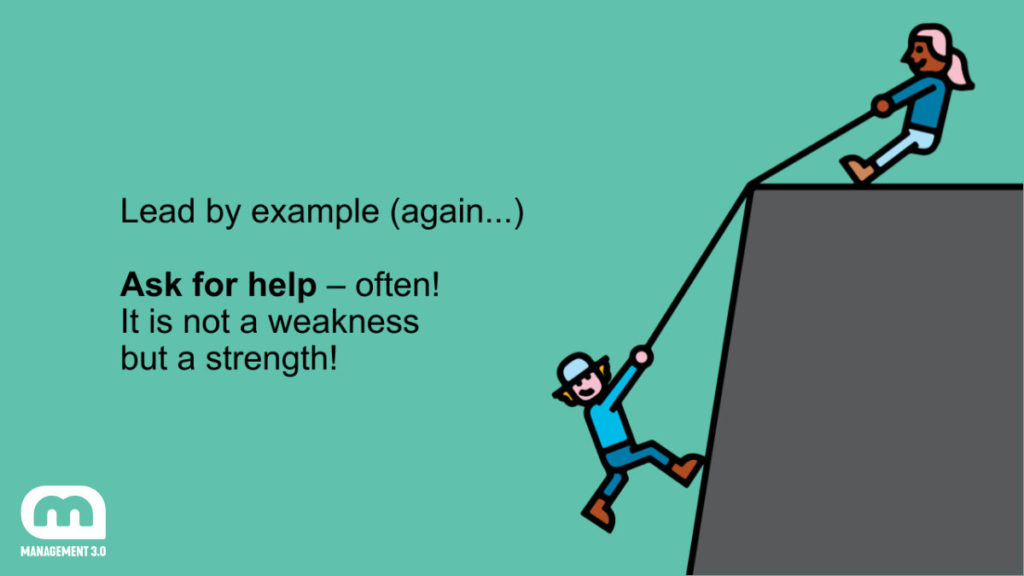Build your resilience: Resilience 101 by Management 3.0 Facilitator Thiago Brant, who holds regular workshops on Agility in HR as well as Emotional Intelligence.
Quick links
What does resilience mean?
Why is resilience important in business?
Why is resilience necessary as a leader?
Can resilience be learned and developed?
The 7 Cs of Resilience
What does resilience mean?
According to the dictionary, resilience is defined as:
- the capacity to recover quickly from difficulties; toughness.
- the ability of a substance or object to spring back into shape; elasticity.
In this article, I will focus on the first definition of resilience, which is about recovering quickly from difficulties, but I’d also like to associate it with the second definition, which comes from physics, because understanding what your “natural state” is and having the ability to return to it when facing difficulties is a great indicator of emotional intelligence and a great differential to produce organizational resilience.
Why is resilience important in business?
Today we live in what we call a VUCA World (a world surrounded by volatility, uncertainty, complexity, and ambiguity) and we have adopted agility as a mindset to navigate this complex world.
I like the definition of agility found in Management 3.0’s Agile Product Development Module: Speed of Change
Things are changing faster, more and more disruptive startups are appearing, and for businesses to stay relevant in this context, we need exactly that: adaptation to change. And the capacity to recover quickly from difficulties (resilience) is exactly that: change in the face of these challenges!
Why is resilience necessary as a leader?
I highlighted the second definition of resilience (elasticity) in the introduction because I associate it with leadership. In the business context mentioned above, leadership plays an important role in fostering organizational resilience.
And this happens in two aspects:
Leading by example
This has been my go-to leadership value
A leader with good emotional intelligence can recover quickly from adverse situations, easily returning to his/her “normal”. The demonstration of resilience is an example to those around him/her for how to handle these situations.
As change agents
The leader of the agile world is a true change agent, and it is he/she who will guide the business (in the context of their teams) to overcome difficulties and thrive in this digital age.
Can resilience be learned and developed?
Of course!
Resilience is like a muscle, and we need to exercise it!
I see three ways in which we can build resilience from different perspectives that complement each other on some level by building both personal and business resilience.
#1 Way how to Develop Resilience: Work on your Emotional Intelligence
The first is to work on our Emotional Intelligence. For this, Management 3.0 itself has an EQ module that suggests five steps to develop your EQ – emotional quotient (Yes, Emotional Intelligence is also something that can be developed!)
- Be in touch with your Emotions – Five times a day, stop yourself and ask the question: What am I feeling right now?
- Increase ‘Joy’ – What puts your mind at ease? What makes you feel calm, fulfilled, and levelheaded?
- Choose positive self-regulating strategies – When you’re frustrated, angry, upset, or annoyed where do you turn? Try things like running, working out, writing, reading, or calling a friend or family member and spending time with them.
- Manage your self-talk – We’re always harder on ourselves than others. Listen to how you’re engaging with yourself and make a point of being positive, complimentary, and kind especially when things are challenging.
- Lean in – Our EQ will only develop as much as we’re willing to put into it.
Once or twice a week, ask yourself questions such as:
- Are you doing your best to achieve your goals?
- Have you asked yourself what you’re feeling?
- Which coping strategies have you turned to?
- Are you doing your best to have honest and engaging relationships?
#2 Way how to Develop Resilience: Be a Change Agent
Another way to develop resilience is to prepare yourself to be a true change agent. This is a vast field of knowledge, and there are many ways and methods of working with change. I see change management as one of the most premium (and expensive!) services offered by big consulting firms, but we can all develop it!
I particularly like Jurgen Appelo’s approach in his book How to Change the World: Change Management 3.0. He brought together, in a simple and fun way, all the major issues to be addressed in change management, and even created a game, the Change Management Game (I love to use it in my Management 3.0 workshops).
The steps are:
- Dance with the system: has to do with the PDCA cycle, lead and follow
- Mind the people: using the ADKAR® Model to understand people and create the desire for change
- Stimulate the network: considers the Adoption Curve to ensure consistency of change
- Change the environment: through the “Four I’s Plus One” – Information, Identity, Incentives, Infrastructure, and Institutions – we work the environment of change
Leaders who know how to manage change create much more resilient environments (and businesses)!
#3 Way how to Develop Resilience: Build a Resilience Network
So we conclude that resilience is something that can be developed, built, and learned. My personal experience has also shown me that, to be more resilient, besides all these alternatives, we must also take care of building a resilience network.
During my evolution through self-knowledge and strengthening my EQ, I realized that an important point is to know when to ask for help. And for help to come, we need to know who to ask. So nurture your relationships and build your network of supporters, whom you can turn to whenever you need help. We are not required to know everything and have all the answers.
In the competency development vision of Management 3.0, there is even a recommendation about leading by example which is: ask for help! When a leader asks for help, he shows that he is not perfect and that asking for help is not a flaw.

Keep an eye on the 7 C’s
Dr. Ginsburg, child pediatrician, and human development expert, also teaches us about 7 components for building resilience in children that we can use as reflection, so that we can strengthen our resilience by supporting building resilience in our teams.
- Competence: Help people feel more competent
- Confidence: Help build confidence by praising people for overcoming obstacles
- Connection: Give people a strong sense of emotional security by encouraging them to express all of their feelings
- Character: Strengthen people’s sense of character by helping them explore who they are
- Contribution: Help people recognize that although they may be in a position of receiving more than they can give, the world is a better place because they are in it
- Coping: Respect a person’s coping style
- Control: Provide opportunities that lend a sense of control
(adapted from Sheri Brisson)
As you can see, resilience can be learned and honed. The first step is to realize how important it is and then to implement practical things that people can do to start working on it. Whether it’s improving your emotional intelligence or building a resilience network, you can build resilience one step at a time as long as you break it down and believe it’s worth it.
Podcast Episodes on Resilience:
- How to Overcome Crisis Fatigue
- Who’s Responsible for Employee Burnout?
- A Glimpse Into The World of Work Post COVID-19
Header photo by Maksim Goncharenok (Pexels)




Awesome ! I travelled along the message about What/Why/Hows of Resilience. Well connected to my thought process. Resilience also talks about, grow in silience too. Resilience, much required these days in VUCA world, says how quick one can RETurn (Recover, Elasticity, Toughness) from odds. Perfect example from nature is, a plant blooming through a broken rock ! Well explained. Thank you.